This chapter focuses on the relationship between young adults and their parents, from the young adults’ perspectives. For many of the questions, young adults ages 18 to 34 were asked to think of a specific parent (if they have more than one living parent). This way, they were able to give more concrete answers rather than trying to generalize about parents with whom they might have different relationships.
Among the key findings:
- A majority of young adults (59%) say their relationship with their parents is excellent or very good. And most (69%) say they can be their true self around their parents – but these views differ significantly depending on whether they’re answering about their mom or their dad.
- 31% of young adults say they rely heavily on their parents for emotional support. While about a quarter of young adults (26%) say their parents rely on them heavily for emotional support, daughters are particularly likely to say this about their mothers.
- Most young adults say they turn to their parents for advice at least sometimes on a range of topics, from their career and finances to their physical health. Relatively small shares report frequent disagreements with their parents.
- Young adults regularly keep in touch with their parents: 61% say they text with their parents and 46% say they talk on the phone or video chat with them a few times a week or at least once a day.
How young adults rate their relationship with their parents
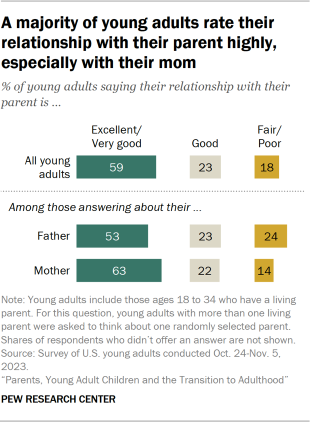
Young adults are generally positive about their relationship with their parent: 32% describe it as excellent and another 28% say it is very good, 23% say it is good, and 18% say it is fair or poor.
Young adults are more likely to say their relationship with their mother is excellent or very good (63%) than to say this about their father (53%). Most of this is driven by young women, who are more likely to rate their relationship highly when answering about their mother than their father. There are no differences among young men in rating their relationship with their mom or dad.
Do young adults feel they can be their true self around their parents?
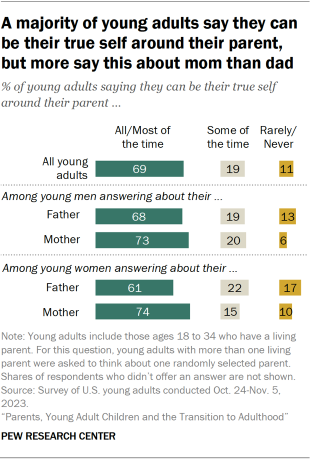
A majority of young adults (69%) say they can be their true self around their parent all or most of the time. About two-in-ten (19%) say they can do this some of the time, and 11% say they can rarely or never be their true self.
Young adults are more likely to say they can be their true self all or most of the time around their mom than to say this about dad (73% vs. 64%). Again, this is mostly driven by young women, who are significantly more likely to say they can be their true self when answering about their mom than when answering about their dad (74% vs. 61%). There is no significant difference on this question among young men.
Young adults across the ages of 18 to 34 are about equally likely to say they can be their true self all or most of the time with their parent. But there’s a significant difference between the oldest and the youngest group when it comes to being their true self all of the time: 37% of 30- to 34-year-olds say this, compared with 26% of 18- to 24-year-olds. Some 32% of 25- to 29-year-olds say the same.
How well do young adults feel they know their parents?
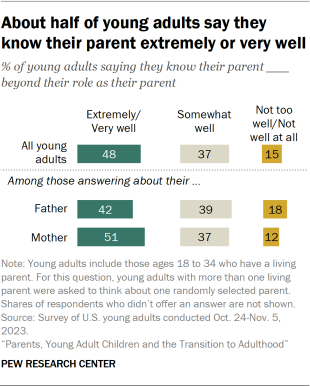
We also asked young adults how well they feel they know their parents beyond their role as a parent. About half of young adults (48%) say they think they know their parent extremely or very well. Another 37% say they know their parent somewhat well, and 15% say they don’t know them too well or at all.
Young adults are more likely to say they know their parent extremely or very well when answering about their mother than when answering about their father (51% vs. 42%).
Emotional support, according to young adults
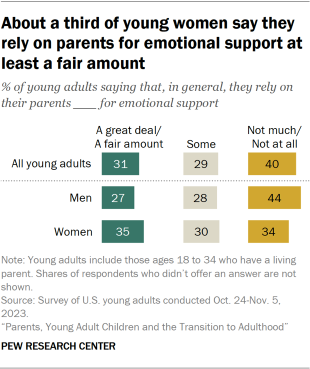
When asked how much they rely on their parents for emotional support, 31% of young adults say they do this a great deal or a fair amount. A similar share (29%) say they rely on their parents some for emotional support, and 40% say they don’t rely on them much or at all.
Young women are more likely than young men to say they rely on their parents for emotional support a great deal or a fair amount (35% vs. 27%).
There’s no significant difference by age group on this question. Young adults in their 30s are as likely as those in their late teens and early 20s to say they rely on their parents for this type of support at least a fair amount.
What young adults say about how much their parents rely on them for emotional support
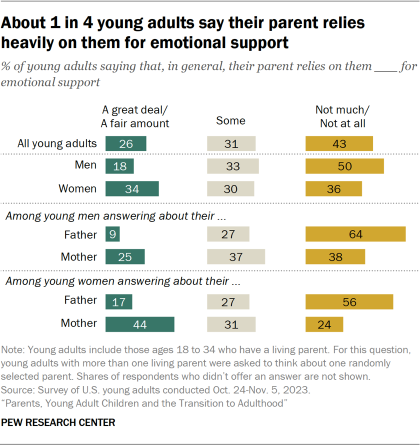
When asked about a specific parent relying on them for emotional support, 26% of young adults say their parent relies on them a great deal or a fair amount, while 31% say they do this some. The remainder of young adults (43%) say their parent does not rely on them much or at all for emotional support.
Young adults are more likely to say their parent relies on them at least a fair amount when answering about a mother than a father. About a third (35%) of young adults say their mother relies on them a great deal or a fair amount, compared with 12% who say the same about their father.
Young women are much more likely than young men to say their parent relies on them a great deal or a fair amount for emotional support (34% vs. 18%). This is even more striking when looking at those answering about a mother: 44% of young women say their mother relies heavily on them for emotional support, while a quarter of young men say the same.
Seeking advice from parents
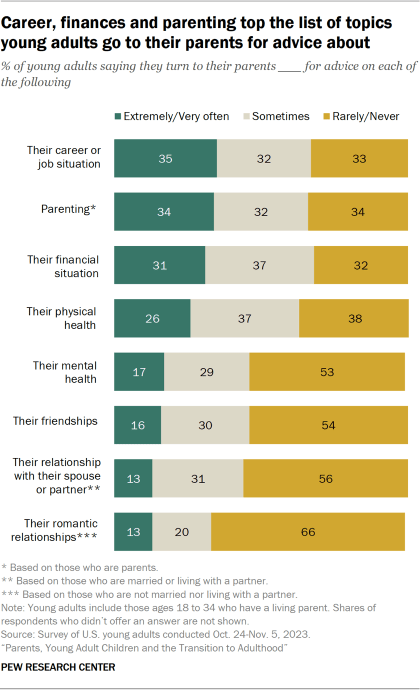
As many young adults face new milestones in their lives, we asked them how often they turn to their parents for advice on a range of topics. Majorities of young adults say they go to their parents at least sometimes for advice on:
- Their financial situation (68%)
- Their career or job situation (67%)
- Parenting their own children (66%)
- Their physical health (62%)
Shares ranging from 26% to 35% say they go to their parents extremely or very often for advice on these topics.
On other topics we asked about, sizeable shares of young adults say they rarely or never go to their parents for advice:
- Their romantic relationships (66%, among those who are neither married nor living with a partner)
- Their relationship with their spouse or partner (56%, among those who are married or living with a partner)
- Their friendships (54%)
- Their mental health (53%)
Differences by age
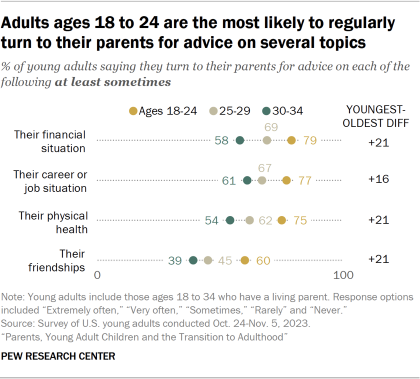
The youngest adults are the most likely to regularly turn to their parents for advice on their finances and careers, as well as on their physical health and friendships.
About three-quarters or more of young adults ages 18 to 24 say they turn to their parents at least sometimes for advice about their financial situation (79%), their career or job situation (77%), and their physical health (75%). Six-in-ten say the same about advice on their friendships. For most of these topics, smaller shares of 25- to 29-year-olds and 30- to 34-year-olds say they seek advice on these topics at least sometimes.
Young adults’ disagreements with their parents
Relatively small shares of young adults say they and their parents disagree extremely or very often on a range of topics.
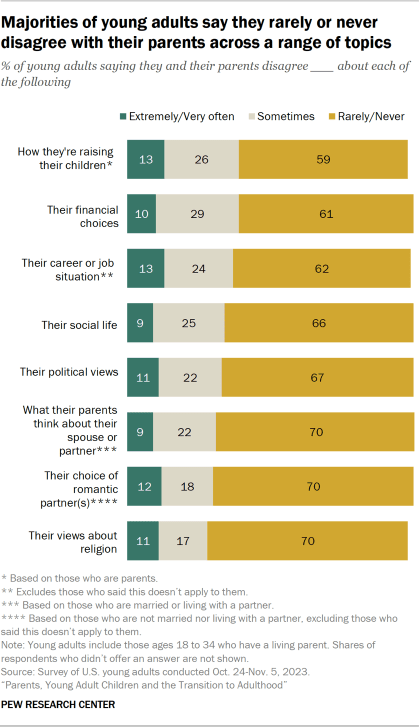
Still, shares of young adults ranging from a third to four-in-ten say they and their parents disagree at least sometimes about:
- How they’re raising their children (40%, among those who are parents themselves)
- Their financial choices (39%)
- Their career or job situation (37%)
- Their social life (34%)
- Their political views (33%)
Three-in-ten or fewer young adults say they and their parents disagree at least sometimes about:
- What their parents think about their spouse or partner (30%, among those who are married or living with a partner)
- Their choice of romantic partners (30% among those who are neither married nor living with a partner)
- Their views about religion (29%)
Differences by gender
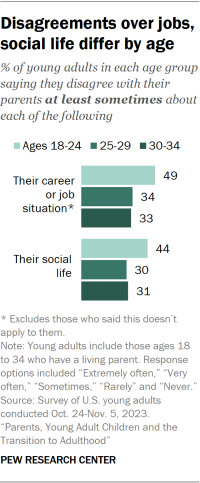
While young men and young women tend to have similar experiences when it comes to disagreements with their parents on a range of topics, young men are more likely than young women to say this occurs at least sometimes around their political views (37% vs. 29%).
And while 42% of young women who aren’t married or living with a partner say they and their parents disagree at least sometimes about their choice of romantic partners, 21% of young men say the same.
Differences by age
Those in the youngest age group are particularly likely to say they and their parents disagree at least sometimes about their career or job situation and their social life. Some 49% of adults 18 to 24 say they disagree with their parents about their career or job situation this frequently. About a third of those ages 25 to 29 and 30 to 34 say the same.
Similarly, while 44% of 18- to 24-year-olds say they and their parents disagree at least sometimes about their social life, about three-in-ten of those age 25 and older say the same.
Differences by income
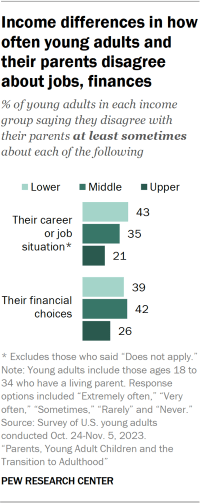
There are also differences by income when it comes to disagreements about finances and work. Young adults with lower and middle incomes are more likely than those with upper incomes to say they and their parents disagree at least sometimes about their financial choices and their career or job situation.
How often young adults are in touch with their parents
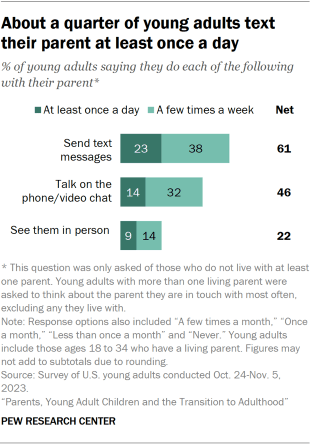
To understand how often and in what ways young adults communicate with their parents, we asked them to think about the parent they communicate with most often, excluding any they may live with.
Text messaging is the most common way young adults say they keep in touch with their parents. About six-in-ten (61%) say they text their parent at least a few times a week, including 23% who say they do this daily. A smaller but substantial share of young adults (46%) say they talk or video chat with their parent at least a few times a week, including 14% who do so at least once a day.
In-person contact is less frequent. About one-in-five young adults (22%) say they see their parent at least a few times a week. About a third (35%) say they see their parent in person a few times a month or once a month. Another 42% say they see their parent less than once a month, including 6% who say they never see their parent.
Differences by gender
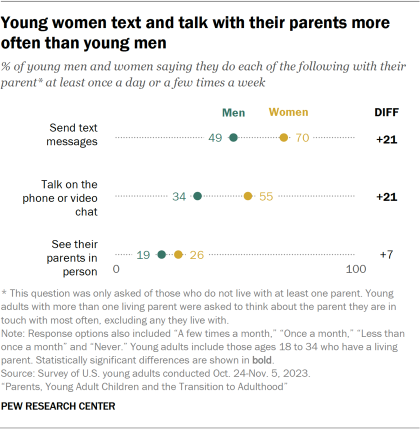
Young women are much more likely than young men to say they text their parent frequently: 70% of young women say they do this at least a few times a week, compared with 49% of young men. In fact, about three-in-ten young women (28%) say they text their parent at least once a day, while 16% of young men say the same.
This pattern holds for talking on the phone, with 55% of young women saying they talk with a parent at least a few times a week, compared with 34% of young men. And young women are more likely than young men to say they talk on the phone with a parent at least once a day (19% vs. 7%).
What young adults think about their parents’ level of communication and involvement in their lives
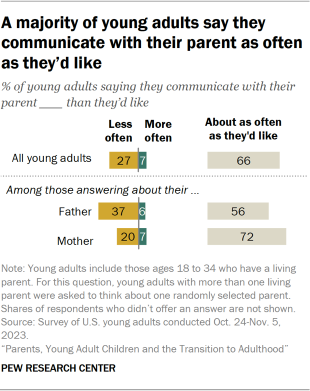
The survey asked young adults to reflect on their communication with their parents and their parents’ level of involvement in their lives. For these questions, young adults with more than one living parent were asked to think of just one (randomly assigned and not necessarily the one they have the most contact with).
Majorities of young adults say they communicate with their parent as often as they’d like (66%). Still, about a quarter (27%) say they communicate less often with their parent than they’d like. Relatively few say they communicate more often than they’d like (7%).
These patterns are similar when it comes to their parent’s level of involvement in their day-to-day life. About seven-in-ten young adults (69%) say their parent is as involved as they would like them to be. Among the remainder, young adults are more likely to say their parent is less involved (22%) than to say their parent is more involved (9%) than they’d like.
Young adults answering about their father are more likely than those answering about their mother to say they communicate less often than they’d like (37% vs. 20%) and that their father is less involved in their day-to-day life than they’d like (29% vs. 17%).


